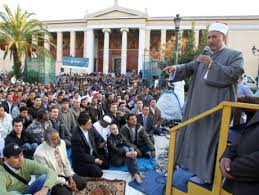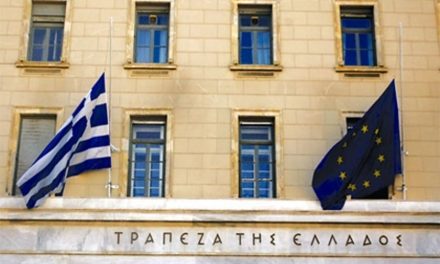Two days before local elections that will show opposition to bailout-driven austerity, there’s little shame in Greece for bombs that are landing in the post box of the European Union.
More than a dozen explosives were discovered by police this week before the Nov. 7 vote, including one sent to German Chancellor Angela Merkel, who helped put together a package of loans in May to bail out Greece.
“Our lives in Greece virtually changed overnight, so it should be no surprise that we see such actions taking place,” said Christina Angreou, 34, a teacher in Athens who is declining to vote. “Not that I’m for such actions, but it’s a protest.”
Prime Minister George Papandreou faces his first test at the ballot box since his 13-month-old government inherited an economy that required a 110 billion-euro ($154 billion) rescue package from the European Union and International Monetary Fund.
After cutting wages and pensions and raising taxes on fuel, tobacco and alcohol, the 58-year-old premier raised the stakes for this weekend by suggesting on television he might call an early national election unless people endorsed his policies. The prospect of political upheaval may spook investors again just after Greece’s cost of borrowing had started to decline.
“He has chosen to turn the municipal elections into a de facto vote of confidence, which seems to involve taking an unnecessary risk at a delicate time,” said Alastair Newton, senior political analyst at Nomura International Plc in London.
Spreads Widen
The difference in yields between Greek 10-year bonds and German bunds of the same maturity jumped 190 basis points to 881 since Papandreou mooted early elections on Oct. 25. The spread had narrowed to 649 basis points on Oct. 18 from a record 965 on May 7, five days after the EU and IMF approved the bailout.
Police said they had detected 14 parcel bombs, including one to Merkel’s office on Nov. 3. Others were sent to Italian Prime Minister Silvio Berlusconi, French President Nicolas Sarkozy and embassies in Athens, including one intercepted yesterday en route to French diplomats, they said.
“Democracy won’t be terrorized,” Papandreou said in statements carried live Nov. 3 on state-run NET TV. “These irresponsible and foolish acts were designed and are designed to hurt the great attempts of the Greek people to get the country back on track, to get the economy back on track.”
The sender of the package to Merkel, who initially refused to rush to Greece’s aid earlier this year, was given as the Greek Finance Ministry, according to a Nov. 3 police statement. Papandreou vowed to track down the perpetrators.
History of Violence
Extremist groups in Greece have a history of small-scale bomb attacks on public buildings or offices of political or business figures. Since the police shooting of a teenager in December 2008 and subsequent unrest, the number of such groups has mushroomed. Attacks by anarchists in May this year during a strike left three people dead.
“It’s so they can distract our thoughts from the election,” said Bado Plemenou, 52, a former hospital worker in Athens who has been unemployed for eight months. “The results will be the same despite the bombings and worse.”
Polls indicate that most Greeks will vote this weekend against the policies to narrow a budget deficit of almost 13.6 percent of gross domestic product. The size of the deficit was discovered after Papandreou won elections in October 2009 on a promise of higher wages and more spending.
About 67 percent of 5,000 voters surveyed by GPO in a poll published Oct. 22 had a negative opinion of the government, up from 57 percent in August. Almost 66 percent of 1,183 Greeks in a Kapa Research poll released Oct. 10 think the country could have avoided asking for funds, up from 42 percent in April.
Election Gambit
Papandreou’s local election gambit risks alienating voters like Aphrodite Kartalou, 61, who said she would reject the government should the premier hold a national vote.
“I don’t like what I consider a threat from the prime minister to vote for government-backed candidates to avoid an impasse and the possibility of general elections,” said Kartalou, a retired secretary who will cast her ballot in the seaside municipality of Saronikos, which is southeast of Athens. “If that happens, then I will vote against the government.”
Papandreou and his socialist Pasok party lead the main opposition New Democracy party. Forty-one percent had greater trust for Papandreou, compared with 23 percent for New Democracy leader Antonis Samaras, according to the Kapa poll.
Papandreou’s call for support has been seen by some as a rallying cry for his disenchanted supporters, some of whom plan to vote for Yiannis Dimaras, one of three lawmakers expelled from the Pasok party after defying Papandreou in the May vote on terms of the bailout.
Getting Tough
Dimaras, 66, is poised to beat the ruling party’s candidate in the race to head the new regional authority for the greater Athens area, according to the GPO poll. His election slogan is “memorandum for the people.”
Anna Kristalou, 50, agrees with Papandreou even though her state schoolteacher’s salary has been cut.
“While tough, the measures introduced by the government are necessary for the good of the country and need to be followed through,” said Kristalou, another voter in Saronikos. “The opposition is in no state to govern.”
This weekend’s ballot is the first since Papandreou’s reorganization of local government. The so-called Kallikratis plan, named after one of the architects of the 2,500-year-old Parthenon Temple, aims to save the central government at least 1.5 billion euros over three years.
Greece’s 1,034 local municipalities will be cut to 325, and 67 regional and prefectures will be replaced with 13 more powerful regional authorities.
The government-backed candidate in Saronikos, Christina Christofaki, the wife of the deputy prime minister, said there will be no protest vote.
Greeks in Saronikos “want someone to solve the problem of landfills, of asbestos water pipes, of sanitation works, filling pot holes and keeping towns clean,” she said in an interview Nov. 3. “For everything else, there are other ballot boxes.”



















